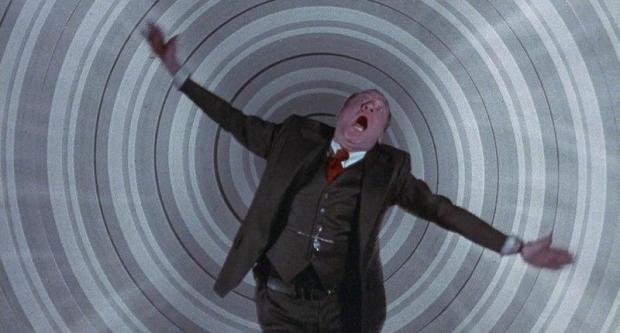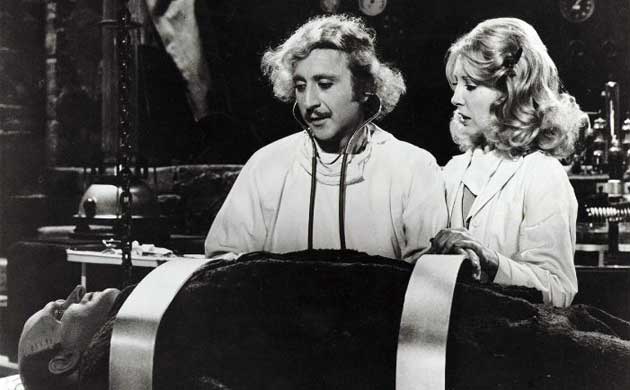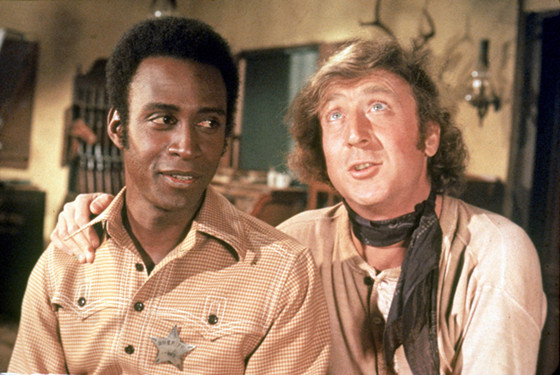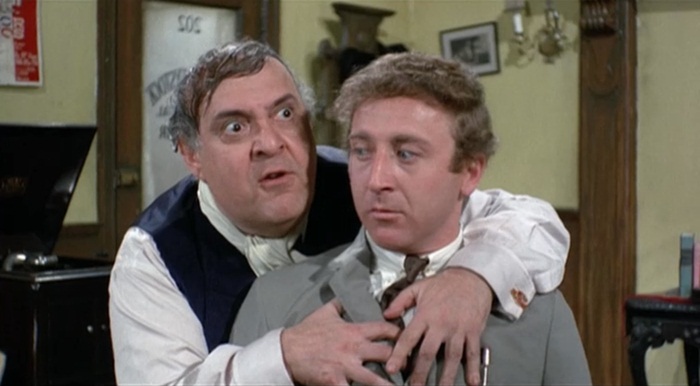6. High Anxiety

“High Anxiety” is a love letter from one legendary director to another. The beautiful thing is that these two filmmakers were masters in very different genres; one of them created the foundations of cinematic suspense while the other created the spoof comedy. What the viewer gets is a loving homage to Alfred Hitchcock in the style of Mel Brooks. And yes, it’s as wonderful as it sounds.
Brooks stars as Dr. Richard Thorndyke, the newly-hired psychotherapist of a mental hospital with the appropriate title of “The Psychoneurotic Institute for the Very, VERY Nervous.” Thorndyke is introduced to a group of suspicious colleagues such as Dr. Charles Montague (another brilliant turn from the underrated Harvey Korman) and his mistress Nurse Diesel (the always enjoyable Cloris Leachman in hilarious neo-Nazi dominatrix form). All of them seem to have something to hide and it isn’t long before Thorndyke begins to suspect a nefarious conspiracy.
If you happen to be a film buff but not a fan of Mel Brooks, I would still suggest you check this one out. If you don’t consider it as hilarious as many of his fans do, at least you will appreciate the ingenious parodies of classic Hitchcock set pieces; there’s “Vertigo” in there, “Psycho” (with future acclaimed filmmaker Barry Levinson stabbing Brooks with a newspaper), “The Birds” (naturally fecal matter had to be involved) and so much more. From the camera angles to the music, it’s a delight for Hitchcock fans.
If you’re still not sure, then the news that Hitchcock himself appreciated this film should be enough praise.
5. History of the World: Part I

Contrary to what I thought as a child, history is never boring. It’s important to know where we come from. The complexities of our world today cannot be understood without having some intimate knowledge of our history. Much of it, however, can drag if the story isn’t written well. This all depends on the storyteller, the historian. And with Mel Brooks delving into our history, you know it might not be entirely accurate, but it will sure be funny – and despite it all, extremely honest in its depiction of human nature.
Basically, the film is a bunch of sketches lumped together. Narrated by the great Orson Welles, this film focuses on the more ”awkward moments” of our history. Naturally, Brooks make sure we laugh while being confronted by the evil of the times. So when Brooks talks about the evils of the Spanish Inquisition, he does this via a musical number.
In the Roman segment, we have the Senate discussing whether they should build houses for the poor but balk quickly when they realize they don’t really care (the exact words they use is ”fuck the poor”). When portraying the greed of the French monarchy, we have the king looking into the camera, breaking the fourth wall as Mel loves to do, and stating: ”it’s good to be the king.”
This is the history of our world, even if we didn’t have stand-up philosophers in the Roman days. And Hitler never really danced on ice. And there was never a Jewish spaceship in the shape of the Star of David (as far as I know).
The film boasts some unforgettable comic set pieces. Gregory Hines, in his film debut, does a hilarious job as slave Josephus. Brooks regulars are all in this film: Cloris Leachman, Harvey Korman, and we even have Dom DeLuise as Emperor Nero (who naturally looks exactly like him). John Hurt makes a cameo as our lord and savior Jesus Christ, being served his last supper by Mel Brooks (well, could be worse, I guess).
4. Spaceballs

The Star Wars universe has been parodied umpteen times, but nobody did it better than Mel Brooks. Years before we’d get the lackluster prequels, the rehash sequel, or the unnecessary prequels, Brooks could see the Hollywood moneymaking machine for what it was.
In “Spaceballs”, Hollywood is gleefully represented by Yogurt, this film’s stand-in for Yoda. He’s a master of the Schwartz (nope, not the force), but his true passion is merchandising – ”where the real money of the movie is made!” The relentless commercialization of Star Wars right now makes “Spaceballs” still so incredibly prevalent, even if it seems mild compared to the madness of today.
The film is packed with unforgettable gags. With Dark Helmet’s introduction (”I can’t breathe in this thing!”) and his crew full of assholes, combing the desert, or the stunt-double gag, this film has some of the funniest gags in Brooks’ oeuvre. And it’s simply hard, perhaps impossible, to choose a favorite. It does have, in my opinion, the best break-the-fourth-wall joke of Mel Brooks’ career, where the villains watch a rental version of “Spaceballs” for a moment and embark on an existential crisis.
Everyone in this film is also perfectly cast. Bill Pullman as Lone Star, Rick Moranis as Dark Helmet, Daphne Zuniga as Princess Vespa, John Candy as Barf, George Wyner as Col. Sandurz, Dick Van Patten as King Roland, and Mel Brooks in a dual role as Yogurt and President Skroob. This is a favorite among many fans and it’s easy to see why.
There have been talks about a possible sequel, which would base itself on “Star Wars Episode VII: The Force Awakens”. If this ever does come to pass, let’s hope that the “Spaceballs” sequel will keep its working title: “Spaceballs 2: The Search for More Money”.
3. Young Frankenstein

After hilariously demythologizing the American West with “Blazing Saddles”, Brooks turned his funny bone to James Whale’s classic entries of the Universal horror genre: Frankenstein and the Bride of Frankenstein. Brooks worked with Gene Wilder on the script and Wilder stars as the delightfully manic Dr. Frederick Frankenstein (you’re probably pronouncing it wrong).
Marty Feldman plays his hunchbacked assistant Igor (you’re probably pronouncing that wrong too) and Cloris Leachman plays Frau Blucher (and pronouncing her name will make any horse in your vicinity neigh in fright). As you can expect, there’s plenty of bad German accents in a Mel Brooks film, thanks to Teri Garr as Inga. Madeline Kahn plays Frankenstein’s fiancée with an incredible operatic voice when she’s sexually excited. Finally, there’s Peter Boyle as the dimwitted (but very hung) creature.
The brilliance of this film is that Brooks makes it look like it was made in the golden age of Universal horror films. The black/white color and the sound design are not just satirizing the genre – it’s a loving tribute. This is something that many spoof films don’t seem to get; the latest bouts of spoof films seem to have contempt for the subjects they’re ridiculing, and in consequence they often become mean and uninspiring – David Zucker’s “An American Carol” is the perfect example of this.
It’s very clear that everyone had the time of their lives making this film – reportedly, the cast and Brooks had so much fun that he added new scenes just so they could continue filming. All of them do such an unforgettable job that it’s hard to choose a standout. Nearly every gag works and even if one doesn’t work, another gag would quickly come along that makes you forget all about it.
For many Brooks fans, this has become a favorite. It’s either “The Producers”, “Spaceballs”, “Blazing Saddles” or “Young Frankenstein”, and all have their separate appeals (and all of them are hilarious).
2. Blazing Saddles

We’ve long grown accustomed to a less romantic version of the American West. Our grandparents might have believed the tall tales of western icons such as John Wayne, whose version of the west was wonderfully simplistic: all about the noble cowboy, fighting for justice in the savage west.
No word about the inherent racism that stripped the African-American people of their rights. Disturbing silence about the genocide of Native-Americans, with much of their culture wiped out by our colonial forefathers. These were not the good old days. There’s nothing to justify a sense of nostalgia for such a brutal period of history.
Sam Peckinpah gave us a glimpse of the inhumanity of the west with hundreds of bullets and buckets of gore. Clint Eastwood said his poignant and earnest farewell to the genre that made him famous in “Unforgiven”, but he was the cool spaghetti gunslinger in this story; he was William Munny, killer of women and children. Perhaps the film that put the final nail on the mythology of the American West was Mel Brooks’ “Blazing Saddles”.
Hedley Lamarr (Harvey Korman) is a corrupt state attorney general who manipulates an easily distracted governor, Petomane (Mel Brooks), to serve his bidding. Hedley wants to build a railroad in Rock Ridge, a small town, and he hires a gang of thugs to scare the townspeople away.
The townspeople refuse to move away and demand that Petomane send a sheriff to protect them. Hedley convinces Petomane to send a black sheriff, something that will scare away these small-minded people. When the new sheriff Bart (Cleavon Little) does appear in Ridge Rock, the people have difficulty accepting him and express this in very unkind ways. With the help of an infamous outlaw, Waco the Kid, (Gene Wilder), Bart does his best to win the hearts of the townspeople and stop Hedley and his gang.
This film has largely been lauded for its casual use of racial epithets. A small-minded person might consider an unfortunate byproduct of its day, but this is not the case. It serves a purpose here: to honestly portray the evil of the times. The hero of this film is the black sheriff who convinces the townspeople of their ignorance.
The butt of the joke is not the victim of the oppressive times – it’s the people who couldn’t see his equal (and oftentimes) superior humanity. Brooks always believed in mocking the evils of this world, because if you can’t joke about evil, you will only make it more powerful. If you can mock it properly, you can destroy this evil in worse ways than drama ever could.
1. The Producers

The comedy world owes a massive debt to Peter Sellers but it might be far bigger than we initially thought. You would think that his roles as Inspector Clouseau or his multiple roles in “Dr. Strangelove” would be his greatest achievements, and this is true. But we should not forget that the existence of “The Producers”, and its massive success that followed, is thanks to Sellers, who pushed executive Joseph E.
Levine to release the picture. Levine, like many of his day, thought the film was in poor taste. During its release, the awareness of the unimaginable crimes of the Nazi regime made it seem to many that any comedic elements toward this subject matter seemed impossible.
Nowadays, we have crossed the threshold of comedic decency so many times that “The Producers” looks relatively tame in comparison. But the debate of satire still looms and the answer will probably never be answered, but one thing is for sure: The Producers is a classic comedy and in very good taste.
Most people probably know this story as a musical. Max Bialystock (Zero Mostel) is a washed-up theater producer in great financial peril – so poor even he’s wearing a cardboard belt. In order to make ends meet, he prostitutes himself to rich old ladies who are into lively role-playing (an acquired taste, perhaps, but much more tantalizing than anything seen in “Fifty Shades of Gray”).
When Leo Bloom (Gene Wilder), a sensitive but deeply neurotic accountant, hypothesizes a scheme that Max could make more money making a flop, Max is immediately intrigued. Like a bumbling Faust, Max seduces a partnership with Leo and the two devise the greatest flop imaginable from a script called ”Springtime for Hitler: A Gay Romp with Eva and Adolf at Berchtesgaden.”
The heart and soul of the producers is Max and Leo. Nathan Lane and Matthew Broderick did a great job on stage, but Mostel and Wilder will always be the definitive inspiration. The friendship that blooms with these two, despite both being rather despicable, is touching amidst the hilarity.
We shouldn’t forget the supporting cast, either. There’s Kenneth Mars as the unhinged playwright and Nazi Franz Liebkind; Christopher Hewett as the cross-dressing and pretentious director Roger; Dick Shawn as Lorenzo, the groovy hippie and lead of the play; and finally there’s Lee Meredith as Ula, the sweetest Swedish assistant one could think of.
This incredible cinematic debut of Mel Brooks instantly marked him as a comedy legend. Perhaps he never reached this height again, though the jury will always be indecisive when it comes to the best Mel Brooks movie, and the three that stand out are always “The Producers”, “Blazing Saddles” or “Young Frankenstein”.
While we’re glad Brooks is still around, the real Max and Leo are already gone. The musical production might still be resurrected every now and again, but the true magic belongs to the original film. Mostel and Wilder’s genius will forever be remembered and if it wasn’t for the direction of Mel Brooks and the persistence of comic visionaries such as Peter Sellers, we might never have been so lucky.